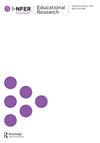Teachers’ pedagogical leadership in early childhood education
IF 2.6
3区 教育学
Q1 EDUCATION & EDUCATIONAL RESEARCH
引用次数: 6
Abstract
ABSTRACT Background Although the contexts, structures and administrations of early childhood education (ECE) may differ internationally, effective pedagogical leadership remains an essential component in supporting young children’s development and learning. This paper reports on a comparative study which considered ECE in two different settings, Finland and Florida, providing insight into teachers’ perspectives on the characteristics of pedagogical leadership. Purpose This study sought to investigate and compare the perspectives of ECE teachers and directors in Finland and Florida via their discourses about teachers’ pedagogical leadership. The goal was to provide an overview of the ECE teachers’ and directors’ discourses in each location, in order to allow comparison and a better understanding of the influence of aspects including locational contexts, curricular guidelines and teacher preparation on the ECE teachers’ and directors’ perspectives. Method A comparative case study design was used. The data consisted of semi-structured focus group interviews and individual interviews with ECE teachers and centre directors in Finland and in Florida. Data from the two locations were first analysed separately to identify the main discourses; secondly, discourses were compared collectively to reveal major themes. Findings The analysis indicated a similar conceptualisation of distributed pedagogical leadership. However, differences were identified in teachers’ expectations of independence in instructional decisions, and the extension of pedagogical leadership practices within and beyond the ECE centres. The analysis of discourses led to the identification of three major themes, which generated implications for teacher preparation, curriculum development and implementation, and ECE programme directions. Conclusion The study enables a more comprehensible conceptualisation of teachers’ pedagogical leadership as it emerged from teachers’ and directors’ discourses across two locations. Pedagogical leadership is recognised as an indicator of high-quality pedagogy in early childhood education and the findings highlight the need to continuously support and strengthen teachers’ pedagogical leadership.幼儿教育中教师的教学领导力
虽然幼儿教育(ECE)的背景、结构和管理可能在国际上有所不同,但有效的教学领导仍然是支持幼儿发展和学习的重要组成部分。本文报告了一项比较研究,该研究考虑了芬兰和佛罗里达州两种不同环境下的ECE,从而深入了解教师对教学领导特征的看法。目的本研究旨在调查和比较芬兰和美国佛罗里达州的ECE教师和主任对教师教学领导的看法。目的是概述欧洲经委会教师和主任在每个地点的发言,以便进行比较和更好地了解地点情况、课程准则和教师准备等方面对欧洲经委会教师和主任观点的影响。方法采用对比案例研究设计。数据包括对芬兰和佛罗里达的欧洲经委会教师和中心主任进行的半结构化焦点小组访谈和个别访谈。首先分别分析两个地点的数据,以确定主要话语;其次,对话语进行集体比较,揭示重大主题。分析表明了分布式教学领导的类似概念。然而,教师对教学决策独立的期望以及在欧洲经委会中心内外推广教学领导实践方面存在差异。对话语的分析导致确定了三个主要主题,这对教师准备、课程制定和实施以及欧洲经委会方案方向产生了影响。该研究使教师的教学领导更容易理解的概念化,因为它出现在教师和导演的话语跨越两个地点。教学领导被认为是幼儿教育高质量教学的一个指标,研究结果强调了持续支持和加强教师教学领导的必要性。
本文章由计算机程序翻译,如有差异,请以英文原文为准。
求助全文
约1分钟内获得全文
求助全文
来源期刊

Educational Research
EDUCATION & EDUCATIONAL RESEARCH-
CiteScore
4.00
自引率
2.90%
发文量
0
期刊介绍:
Educational Research, the journal of the National Foundation for Educational Research (NFER), was established in 1958. Drawing upon research projects in universities and research centres worldwide, it is the leading international forum for informed thinking on issues of contemporary concern in education. The journal is of interest to academics, researchers and those people concerned with mediating research findings to policy makers and practitioners. Educational Research has a broad scope and contains research studies, reviews of research, discussion pieces, short reports and book reviews in all areas of the education field.
 求助内容:
求助内容: 应助结果提醒方式:
应助结果提醒方式:


